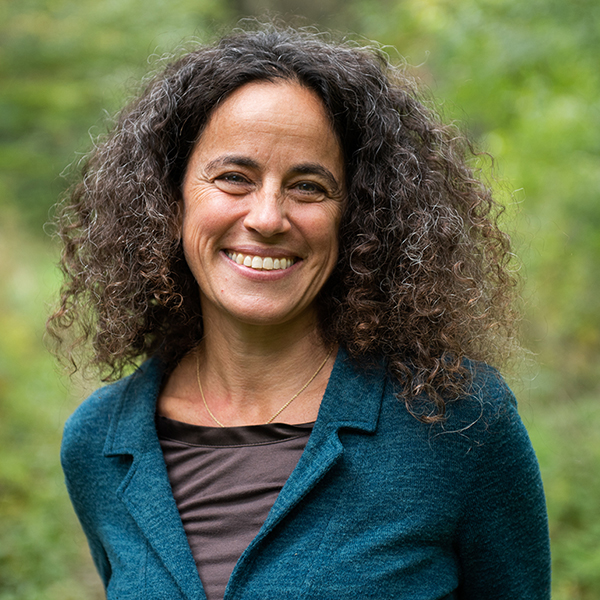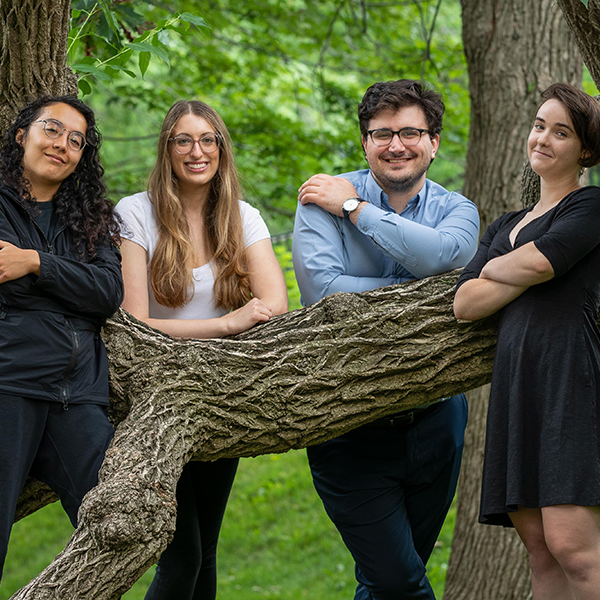Under ordinary circumstances, scientists don’t like to be rushed when they put together proposals for research projects. And granting agencies don’t want to be rushed when they assess those proposals for funding.
But these aren’t ordinary times.
The McGill Interdisciplinary Initiative in Infection and Immunity (MI4) recently announced the first 16 recipients of funding from its MI4 Emergency COVID-19 Research Funding program. The program was put together quickly. Very quickly.
“We launched the program on Friday March 20 at midnight and closed round one of the competition on March 27 at noon,” says Don Sheppard, the director of MI4. “We reviewed 40 proposals over the weekend and identified the projects that we thought were ready to go based on three criteria – we wanted projects that would be innovative, projects that would be feasible, and projects that would be impactful in a short time frame.
“Putting all this together in such short time was a Herculean effort,” says Sheppard, who also chairs the Department of Microbiology & Immunology and is a senior scientist at the Research Institute of the MUHC. “We had 40 groups of researchers go from zero to 60 to create these proposals and submit them to us in under a week. That’s a tremendous achievement.”
The proposals were reviewed by a team of experts that included Sylvain Baillet, the Faculty of Medicine’s associate dean, research; Tim Evans, the director and associate dean of the School of Population and Global Health in the Faculty of Medicine; Philippe Gros, McGill’s deputy vice-principal, research and innovation; and Bruce Mazer, the executive director and chief scientific officer of the Research Institute of the MUHC, among others.
As countries around the world continue to struggle with the havoc caused by the COVID-19 pandemic, Sheppard says MI4 is prepared to move swiftly. In fact, MI4 researchers are already busy on a number of fronts – assessing promising treatment options, working on potential vaccines, and examining why the disease has been able to spread so quickly. The MI4 Emergency COVID-19 Research Funding program will provide funding for these and more initiatives.
“When we launched MI4 just over two years ago, this type of scenario was exactly what we had in mind,” says Sheppard. “We wanted to unite all of the research efforts that were being done on infectious diseases and immune responses across the University – on both campuses, in all of McGill’s research centres, and in all of [McGill’s teaching hospitals and their affiliate research institutes]. We wanted to be in a position to bring all of that interdisciplinary expertise to bear if we found ourselves facing this sort of pressing challenge to human health.”
Sheppard points to the emergency research fund projects as a concrete example of how swiftly MI4 can pivot when urgent situations need to be addressed.
“We have more than 250 researchers in the MI4 ecosystem and we are ready to move on this. The outbreak is here in Montreal and we have patients who are sick now, so now is the time to do the studies – not two months from now, not three months from now, and not six months from now.
“We saw the writing on the wall very early on,” says Sheppard. In January, when reports began emerging of a mysterious new virus that was sweeping through Wuhan, Sheppard says he and many of his MI4 colleagues predicted what might happen next.
“It was hard to believe that, with the number of international flights that go in and out of Chinese cities, this disease was not going to escape the borders of that country. We put out a call at the end of January to all our investigators to start thinking about this and offered a $100,000 prize to the first project [that would focus on] what we could do if the pandemic came to Canada,” says Sheppard. The $100,000 prize went to medicine professor Chen Liang for a project that will probe how COVID-19 manages to elude our immune system’s natural defenses – Liang’s project has subsequently received further funding from the Canadian Institutes for Health Research.
“When it became apparent that [COVID-19] was coming to Canada, we began to raise money to support [more research efforts] with the help of the MUHC Foundation,” says Sheppard.
The MI4 Emergency COVID-19 Research Funding program has received support from the Hewitt Foundation, the late Elspeth McConnell, and the Trottier Family Foundation, through gifts made to the MUHC Foundation. About $1.5 million will be distributed to the first 16 projects supported by the emergency fund. In all, $4 million has been raised to bolster research efforts as well as provide support to patients and resources to hospitals.
Sheppard says it’s crucial to combat COVID-19 on a variety of fronts – not just to mitigate the damage that is being done by this particular outbreak, but to learn how to effectively limit the effects of possible future pandemics.
“What is happening around the world is horrific, but this might be the best dress rehearsal we are ever going to have,” says Sheppard. “The overall ability of this virus to spread is superb, but it’s still not a very deadly virus. Certain groups like older adults and those with pre-existing medical conditions are clearly at risk, but this isn’t a virus like MERS-CoV that kills a very high percentage of people across the board. That’s the true pandemic nightmare – a virus that can spread like [COVID-19], but that has a 30 per cent mortality rate.”
The good news, says Sheppard, is that the medical scientific community is focusing its efforts on the coronavirus in an almost unprecedented way. “People have shut down everything to concentrate on coronavirus research. Ideas are coming in fast and furious. We need to be agile and we need to be able to move quickly at a time like this.”
MI4 Emergency COVID-19 Research Fund Project Summaries (Round One)
Matthew Cheng, Department of Microbiology & Immunology, is leading a team conducting a clinical trial to test the efficacy of existing drugs against COVID-19, in the hopes they may improve outcomes as a vaccine is being developed. This effort is part of a larger, global initiative under the auspices of the World Health Organization.
Matthew Cheng is also undertaking a clinical study to identify biomarkers that can help predict disease outcomes and response to treatment in individual patients. This study is funded by the Canadian Institutes for Health Research (CIHR) and linked to a global effort to identify effective biomarkers for COVID-19.
Jörg H. Fritz, Department of Microbiology & Immunology, is working with international collaborators to better understand the immune response to COVID-19, defining how antiviral immunity functions at a molecular level, in order to develop tests to determine who is immune, and inform vaccine development.
John Hanrahan, Department of Physiology, is developing drugs that can prevent coronavirus from moving from one cell to another, potentially stopping the disease before it can spread throughout the body.
Lara Khoury, Faculty of Law and associate member, Institute for Health and Social Policy, is working with collaborators to use this once-in-a-generation crisis to evaluate public powers and accountability mechanisms in relation to emergency public health decision-making, focusing on how governments can remain accountable while exercising sweeping legal and regulatory authority.
Irah King, Department of Microbiology & Immunology, is looking at how targeting the gut microbiome—the vast microbial community living in the intestine— might offer treatment options for COVID-19. This study builds on existing evidence that the gut microbiome affects our immune response to respiratory infection, that evidence of the disease shows up in fecal swabs and stool samples, and that COVID-19 patients with gastrointestinal symptoms often experience worse outcomes.
Todd C. Lee, Department of Medicine, Division of Infectious Diseases, is conducting a Quebec-wide trial to test the efficacy of hydroxychloroquine—a malaria medication that has produced some limited positive results in smaller studies which require confirmation — for both prevention and early treatment of COVID-19. Dr. Lee is coordinating a national trial involving other provinces and this Canadian trial is partnered with a U.S.-led study so as to arrive at the answers in the shortest time possible.
Mathieu Maheu-Giroux, Department of Epidemiology, Biostatistics and Occupational Health, is using statistical and mathematical models of COVID-19 disease transmission to provide daily provincial-level updates on the state of the epidemic in Quebec and Canada. This will inform government decision-making by providing real-time forecasts of the rate of COVID-19 spread the demand on the health care, and the impact of social distancing measures and other preventive strategies.
Sara Mahshid, Department of Bioengineering, has developed a prototype that can potentially simplify testing of SARS-Cov2 RNA via a colorimetric approach, making it easier and cheaper to manufacture tests, and providing faster results for diagnostics of COVID19.
Richard Menzies, Department of Medicine, Division of Respiratory Medicine, is examining the medical and economic costs and benefits of multiple different COVID-19 testing strategies, ranging from expanded but targeted testing of individuals particularly testing all contacts of confirmed cases, testing all essential workers, testing all workers and students, to universal testing. This data can inform testing policy in Quebec, in Canada and other countries.
Nicolas Moitessier and Anthony Mittermaier, Department of Chemistry, are partnering with Molecular Forecaster, a Montreal company, to use innovative computational methods to design new drugs that target one of the key biological mechanisms by which COVID-19 replicates and spreads. Selected compounds will then be synthesized and evaluated as potential antiviral agents. This work builds on knowledge gained from the SARS and MERS epidemics, as well as work the team has done on cancer and Parkinson’s drug development.
Joaquin Ortega, Department of Anatomy and Cell Biology, is exploring a novel vaccine approach to eliciting a stronger immune response by creating protein-based virus-like particles, as a complement to other efforts to create vaccines based on RNA and DNA. In this project Ortega will collaborate with Duane Chung at Algaeneers, a leading bio-manufacturing company in Ontario.
Martin Schmeing, Canada Research Chair in Macromolecular Machines and Director, Centre de recherche en biologie structurale (CRBS) and Don van Meyel, director of the Centre for Translational Biology, are working to develop large-scale, local production of the key ingredients needed for COVID-19 testing. Currently, these materials are made out of country, and Canada must compete for scarce supplies. Their goal is to ensure an adequate supply of tests for Canadians and support expanded testing strategies to help control the spread of COVID-19 more effectively.
Abhinav Sharma, Divisions of Cardiology and Experimental Medicine, is conducting a randomized clinical trial to determine if a class of commonly-prescribed drugs used for patients with cardiovascular diseases and high blood pressure contributes to outcomes among individuals with a COVID-19 infection. This study will provide important guidance for managing heart disease and high blood pressure during the COVID-19 pandemic.
Benjamin Smith, Department of Medicine, Division of Respiratory Medicine, is studying how highly targeted testing strategies might reduce the length of time that health care workers must spend in isolation following exposure to COVID-19. The goal is to use early, targeted viral testing to identify those health care workers who can safely return to work as early as one week before the full 14-day quarantine is completed while ensuring those who are infectious remain in isolation, thereby preserving this vital workforce while making sure patients are safe.
Brett Thombs, Department of Psychiatry, is conducting (1) a large-scale, worldwide study on mental health impacts of COVID-19 and mitigation efforts like social distancing, particularly on people already suffering from chronic medical conditions and (2) a trial of an intervention designed to reduce negative mental health effects.


